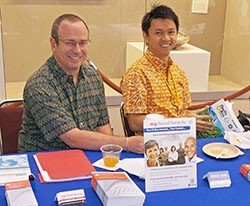CDS Champions Jobs for People with Disabilities (HI UCEDD)
March 19, 2018

|
People with disabilities are working, training for jobs, or searching for better jobs. Clearly, work is important for people with disabilities. But in the search for employment, many run into barriers that rarely confront their counterparts without disabilities. Find out why this is so and learn why CDS researchers say a change has got to come--for everyone's benefit.
All too often employers operate under the mistaken impression that hiring people with disabilities will mean paying out big money for special accommodations in order to meet legal requirements. Likewise, people with disabilities often worry that being hired will disqualify them for public programs crucial for coping with their special needs. These are but a few examples of the persistent myths that create barriers between Hawaii jobseekers with physical, cognitive or mental disabilities and Hawaii employers with job vacancies that are especially plentiful now that the Aloha State is experiencing a record-breaking low unemployment rate, according to the latest figures from the Department of Labor and Industrial Relations.
So it happened that myth-busting was high on the agenda at the Employment Forum held October 11 at the Hilton Hawaiian Village as part of the 33rd Annual Pacific Rim International Conference on Disability and Diversity, sponsored by CDS. Titled "Great Employers Making Workplaces Great," the forum attracted a capacity crowd of employers, disability specialists, human resource professionals, and self-advocates.
"A main purpose of the forum was to get out the word that it is easy and rewarding to diversify the workplace by hiring people with disabilities," said CDS Assistant Specialist William Mihalke. Government services make it cost-efficient for employers to comply with laws related to disability, while laws protecting the rights of people with disabilities make it possible to enroll in public programs for job training and job placement and keep other forms of public assistance, including Medicaid, Mihalke said.
In one of more than one-dozen sessions featured at the Employment Forum, several local employers engaged in a roundtable discussion about their own experiences in recruiting new employees from a largely untapped pool of people with disabilities; all agreed that this led to win-win outcomes. "Some said it was just the right thing to do. We heard from one employer who said that giving jobs to qualified individuals with disabilities was his way to give back to his community," said Chin Lee, a junior specialist at CDS and the lead organizer of the October forum. Roundtable participants represented a range of work sectors and businesses, including the hospitality industry, the State Department of Human Resources Development or DRHD, the Naval Station at Pearl Harbor, Enterprise Rent-A-Car and Lowe's Home Improvement.
"Those with experience in job development generally agree that people with disabilities are absolutely dedicated to their jobs, and they often turn out to be the hardest workers who keep down turnover," said CDS support specialist Lisa-Marie Tam.
Despite signs of progress, CDS specialists are quick to point out the many challenges that remain. The latest statistics from the U.S. Department of Labor indicate that up to 80-percent of people with disabilities experience chronic joblessness, in spite of wanting to work. More has to be done to ensure that people with disabilities have a fair chance at landing good jobs that provide decent benefits, career advancement, and the sense of personal dignity which comes with being able to make a steady living. CDS continues to help by leading the multiagency Hawaii Jobs Now Partnership. Under this federal grant-funded initiative, the goal is to remove systemic barriers and put competitive employment opportunities within reach of youth and young adults with intellectual disability and developmental disability. "We look forward to mounting a pilot project which will reduce systemic barriers and use widespread commitment of many partners in bringing about positive change," said Chin Lee.







